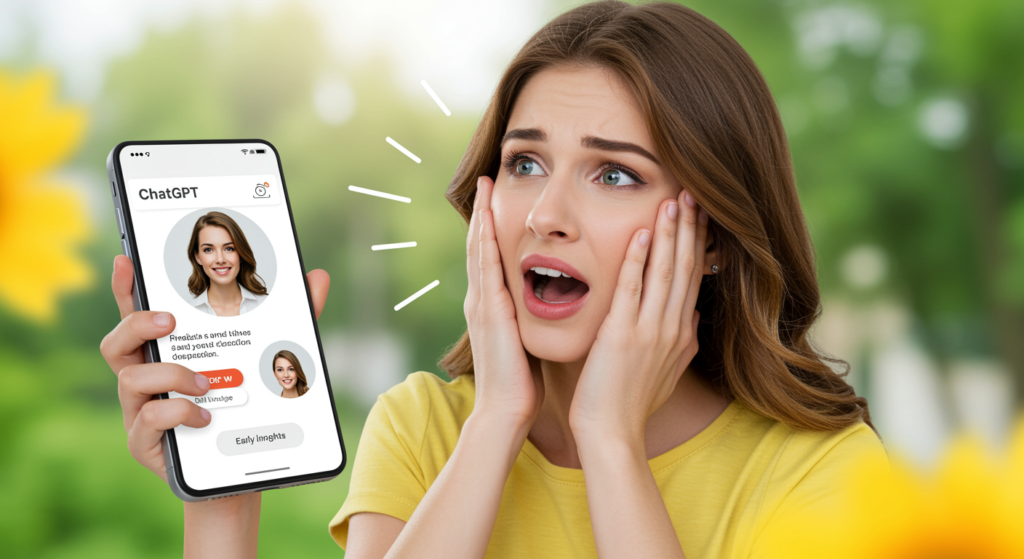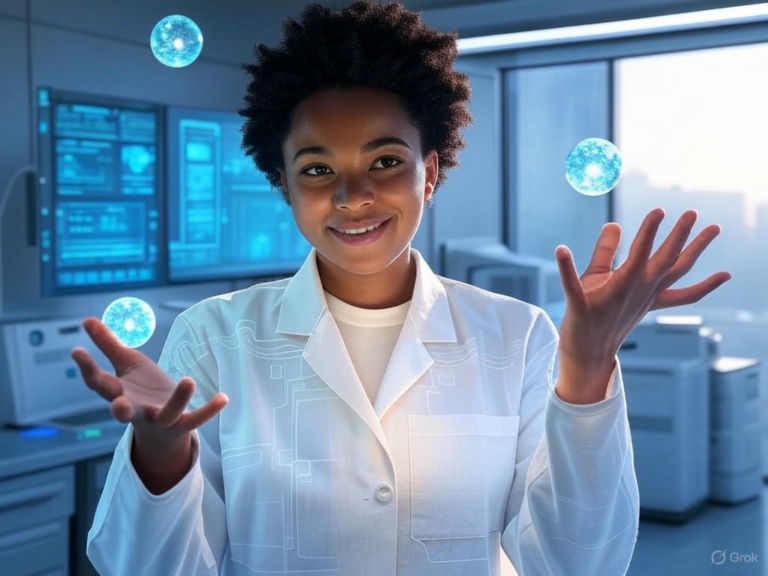
ChatGPT Saves Woman’s Life: Inspiring AI Survival Story
Introduction to AI in Healthcare
ChatGPT in Healthcare is emerging as a game-changer, blending advanced technology with everyday health concerns to potentially save lives. In recent years, Artificial Intelligence (AI) tools like ChatGPT have stepped into the spotlight, offering quick insights that complement traditional medical practices. This article dives into inspiring stories where ChatGPT provided crucial guidance, highlighting its role in early disease detection and beyond.
Imagine turning to an AI chatbot for advice and ending up with a lifeline—it’s happening more often than you might think. While AI isn’t a replacement for doctors, its ability to analyze symptoms rapidly can prompt users to seek help sooner, as seen in several real-life cases.
Real-Life Examples of ChatGPT’s Impact
Have you ever wondered if a simple chat with an AI could change your life? For some, it has. Let’s explore a few stories where ChatGPT in Healthcare made all the difference, turning overlooked symptoms into timely interventions.
Lauren Bannon’s Story: As a busy mother of two, Lauren initially brushed off her aches as everyday stress. Doctors diagnosed her with arthritis and acid reflux, but something didn’t feel right. When she consulted ChatGPT, it suggested exploring Hashimoto’s disease based on her symptoms. This led to further tests that uncovered thyroid cancer early, allowing for successful treatment. It’s a powerful reminder of how ChatGPT in Healthcare can spot patterns humans might miss.
Natallia Tarrien’s Story: During her pregnancy, Natallia experienced a tight jaw that worried her. Turning to ChatGPT for clarity, she received an urgent recommendation to check her blood pressure immediately. The AI’s advice prompted her to call for emergency help, revealing dangerously high levels that could have been fatal. Thanks to this quick intervention, both Natallia and her baby are safe today, showcasing the life-saving potential of early disease detection with ChatGPT.
Marly Garnreiter’s Story: At just 27, Marly from Paris dealt with fatigue and minor pains she thought were from her hectic lifestyle. ChatGPT analyzed her description and hinted at possible blood cancer signs almost a year before official diagnosis. This early alert gave her the push to get checked, emphasizing how tools like ChatGPT in Healthcare can bridge gaps in traditional diagnostics. These examples aren’t isolated; they’re part of a growing trend where AI empowers people to act on their health.
What if you had access to such insights? It’s worth considering how AI like ChatGPT could play a role in your own health journey.
How AI Aids Early Disease Detection with ChatGPT
Early disease detection with ChatGPT is transforming how we approach health issues, by sifting through vast data to identify red flags quickly. AI tools excel at processing information faster than humans, often uncovering hidden connections in symptoms that lead to earlier interventions.
For instance, if you’re experiencing unexplained tiredness, ChatGPT can cross-reference that with thousands of cases to suggest possible causes, encouraging you to consult a professional. This capability doesn’t just save time—it can save lives by catching problems before they escalate.
Analyzing Symptoms and Patterns
One of the standout features of ChatGPT in Healthcare is its ability to analyze symptoms and patterns with remarkable accuracy. By drawing from a massive database of medical knowledge, it can detect anomalies that might evade even experienced clinicians. Think about it: in a world where we’re often juggling multiple symptoms, an AI can provide a fresh perspective almost instantly.
For example, if a user describes a combination of fatigue, weight changes, and mood swings, ChatGPT might flag thyroid issues or other conditions. While it’s not diagnosing, this analysis promotes early disease detection with ChatGPT, urging users to seek verified medical advice. The key is using it as a supportive tool, not a standalone solution.
Encouraging Further Investigation
AI like ChatGPT doesn’t just stop at analysis; it actively encourages further investigation, turning passive users into proactive health advocates. Many people ignore subtle signs, but a chatbot’s prompt can make all the difference. For instance, if ChatGPT suggests monitoring blood pressure based on your inputs, it might motivate you to visit a doctor right away.
This encouragement is especially valuable in underserved areas where access to healthcare is limited. By fostering awareness, early disease detection with ChatGPT helps bridge gaps, potentially preventing serious outcomes. Remember, the goal is to empower you to take the next step—always follow up with a healthcare provider.
Challenges and Limitations of ChatGPT in Healthcare
While ChatGPT in Healthcare offers exciting possibilities, it’s not without its hurdles. One major challenge is ensuring the reliability of the data AI uses, as inaccuracies in training could lead to misleading advice. For example, if the AI’s knowledge base isn’t up-to-date, it might overlook emerging health trends.
Regulatory issues also play a role; most AI tools lack official approval as medical devices, meaning they’re best used alongside professional guidance. Additionally, building user trust is ongoing—some might hesitate to rely on AI over a doctor’s expertise. Despite these limitations, addressing them could enhance the role of ChatGPT in early disease detection and overall healthcare.
Conclusion and Future Perspectives
The stories we’ve covered show how ChatGPT in Healthcare is already making a tangible impact, from cancer detection to emergency interventions. As AI evolves, it could become an even more integral part of our health toolkit, but only if we balance its benefits with professional oversight.
Looking ahead, the future of early disease detection with ChatGPT holds promise for personalized medicine and faster responses to health threats. If you’re curious about incorporating AI into your routine, start by using it for general questions and always verify with experts. What are your thoughts on AI’s role in healthcare—have you tried something like ChatGPT yourself?
We’d love to hear your experiences in the comments below. Share this story with friends who might benefit, and explore more on AI’s growing influence by visiting the World Health Organization for in-depth resources. Let’s keep the conversation going and stay informed together.
References
1. Fox News. “Woman says ChatGPT saved her life by helping detect cancer which doctors missed.” https://www.foxnews.com/health/woman-says-chatgpt-saved-her-life-helping-detect-cancer-which-doctors-missed
2. iHeartRadio. “AI with a Heart: ChatGPT Helps Save Pregnant Woman and Her Baby’s Life.” https://mix1065.iheart.com/featured/toby-knapp/content/2025-04-14-ai-with-a-heart-chatgpt-helps-save-pregnant-woman-and-her-babys-life-/
3. Hindustan Times. “Woman credits ChatGPT for saving her life after asking a question just for fun.” https://www.hindustantimes.com/trending/woman-credits-chatgpt-for-saving-her-life-after-asking-a-question-just-for-fun-101744873502504.html
4. PEOPLE. “ChatGPT Diagnosed Woman’s Blood Cancer Before Doctors.” https://people.com/chaptgpt-diagnosed-woman-blood-cancer-before-doctors-11720358
5. News Mania. “Did ChatGPT Save Someone’s Life?” https://www.newsmania.co.in/did-chatgpt-save-someones-life/
Additional resources: Backlinko, God of Prompt, Search Engine Land (for SEO context).
ChatGPT in Healthcare, AI Survival Stories, Early Disease Detection, ChatGPT Saves Lives, AI in Healthcare, Disease Detection with AI, ChatGPT Health Advice, AI Medical Tools, Healthcare AI Stories, AI Early Intervention





